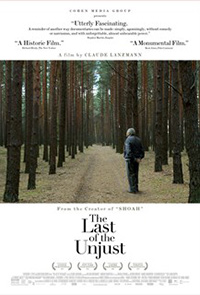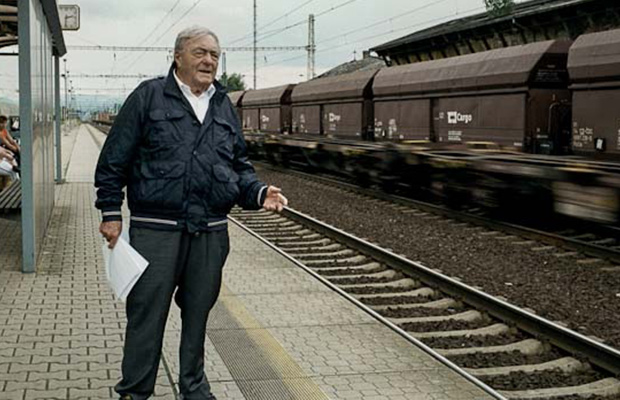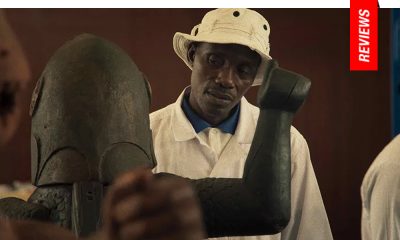Reviews
The Last of the Unjust | Review
Return to the Void: Lanzmann Resurrects Murmelstein
 Claude Lanzmann’s unfathomable devotion to exposing the truths of the Holocaust is incomparable in the history of cinema. No other filmmaker has devoted his professional career almost entirely to a single topic, say nothing of one so densely despicable. And yet, since the 70s, Lanzmann has been hard at work, totally immersed in research regarding Hitler’s mass extermination of the Jews, and the resulting 9 hour aural history that is Shoah turned out to only be the beginning. The documentarian has returned to the subject with leftovers from his Shoah era interviews in a series of riveting shorter films – Sobibor, Oct. 14, 1943, 4 p.m, The Karski Report and his first feature to focus on Theresienstadt, A Visitor From The Living. Once again, at the age of 87, Lanzmann takes us back to the Nazi staged propaganda town, this time seeking the perspective of Benjamin Murmelstein, the sole survivor appointed as the ghetto’s Jewish elder in his latest aural history, The Last of the Unjust.
Claude Lanzmann’s unfathomable devotion to exposing the truths of the Holocaust is incomparable in the history of cinema. No other filmmaker has devoted his professional career almost entirely to a single topic, say nothing of one so densely despicable. And yet, since the 70s, Lanzmann has been hard at work, totally immersed in research regarding Hitler’s mass extermination of the Jews, and the resulting 9 hour aural history that is Shoah turned out to only be the beginning. The documentarian has returned to the subject with leftovers from his Shoah era interviews in a series of riveting shorter films – Sobibor, Oct. 14, 1943, 4 p.m, The Karski Report and his first feature to focus on Theresienstadt, A Visitor From The Living. Once again, at the age of 87, Lanzmann takes us back to the Nazi staged propaganda town, this time seeking the perspective of Benjamin Murmelstein, the sole survivor appointed as the ghetto’s Jewish elder in his latest aural history, The Last of the Unjust.
Returning to the long form feature, Lanzmann’s latest runs just over 3.5 hrs. Like in Shoah, much time sees him return to places of inhumanity, the grey-haired filmmaker himself wandering in and out of the frame, exploring the weathered rubble left behind. Today, much of Theresienstadt’s brick and mortar structures still stand, none with the distinct looming dread of the gates of Auschwitz, but telling none-the-less, taking into consideration the faux neighborhood this particular ghetto was supposed to represent. In these foreboding locales where executions took place and elderly rested in refurbished attics now crumbling, the director reflects by reading passages of speeches made by murdered Jewish elders and researchers looking back to remind of the devastation that took place in these very spots. Cinematically this works incredibly well with shorter pieces, as there is usually follow-up commentary that grounds his chosen words, but ones of considerable length often lose their weight as he begins to drone, reading straight from paper.
A first for Lanzmann’s Holocaust films (if my memory serves right), Unjust also makes use of period footage with a Nazi propaganda film shot in 1944 on Theresienstadt titled (via translation), Terezin: A Documentary Film from the Jewish Settlement Area. It’s a brief but telling bit of evidence of the town’s true purpose. Murmelstein himself admits to working with famed S.S. Officer Adolf Eichmann to maintain the ghetto’s facade, emphasizing that his intent was to give the Nazis a reason not to liquidate the village like so many others had been. In truth, for thousands of Jews, Theresienstadt was merely the last stop before finding their end in Treblinka or Auschwitz, but the elder authentically stands by his word that he was ignorant of the Final Solution until after the war.
Murmelstein has long been criticized for his collaboration with Eichmann, but Lanzmann’s interview with the only surviving elder seems to absolve the man of any wrongs he may have done in Theresienstadt. People have long seen him as a man in league with the Nazis, following orders of cruelty and terrorism in exchange for his own skin, overlooking the fact he did stick his neck out, eventually orchestrating the emigration of 120,000 Jews, ultimately saving them from the gas chambers. The Last of the Unjust gives us a glimpse of the nerve that Murmelstein must have had to survive in his post as Jewish elder. A man of supreme wit and unfathomable courage in the face of pure evil, Murmelstein has been given the final, often surprisingly entertaining, word thanks to Lanzmann’s unending devotion to recording the aural history of the Holocaust.
Reviewed on September 5th at the 2013 Toronto International Film Festival – TIFF Docs Programme. 218 Min.
































